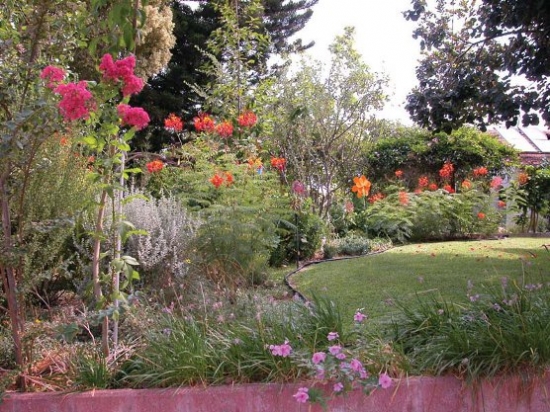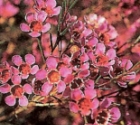
Sima Kagan's garden in Moshav Sitriya.
Sima Kagan, M.Sc. lives in Moshav Sitriya in the Shfela (central plain) region. Years ago she realised that water is a fast-dwindling resource that is also getting more and more expensive. She decided to study this problem and look for solutions, long before the rest of the world took notice of it.
In the 1970's she started her research of garden plants that require little or no irrigation. She collected such plants in Israel and abroad, some of which had to be introduced gradually to the local soil and climate.
For her lifetime achievements in acclimatising and promoting garden plants, she was awarded the 'Oscar for Agriculture' by the minister of agriculture at the Agro-Mashov exhibition in April 2009. Over the 28 years of her activity, Sima has had a considerable influence on landscape designers. Many of the plants used in gardens these days were introduced by her. Sima disseminates her findings to gardeners and nursery managers through articles in gardening magazines, lectures, courses, and private consulting. She produces and gives seedlings to nurseries and thus enables the public to benefit from the plants which she found suitable for the Israeli climate.
Everyone wants green, flowering plants
Sima has always carried out her academic work with a deep devotion to the soil and plants. She grows plants that provide greenery in flower bouquets, and is well aware of people's love and need for green plants. "Water is getting ever scarcer and more expensive" she says. "Eventually we will all have to pay the high cost of desalination. We live in a Mediterranean country, parts of which are desert. Most Mediterranean plants spend the summer without leaves, but we all want green, flowering plants all year round."
Sima started her research and experiments with the aim of reaching an optimal balance between what people want, the shortage of water and the local climate. She has been working for many years at the Agriculture Research Organization, the Volcani Center, Department of Ornamental Horticulture. Her professional niche is the acclimatisation of garden plants that require little irrigation. "These plants" she says, "are green and flowering, and they can grow anywhere from Kiryat Gat northward with no irrigation, or with only 2–4 waterings per year."
Imported plants
Sima's work includes reading professional publications and books, searching and collecting suitable plants during her trips around the globe, and acclimatising the collected plants (seeds, cuttings, etc.). "There is a lot of trial and error in my work" she says. "I collect plants that have shown they can survive in arid zones, but when transferring them to new soil and climate, there are many other parameters to be studied and checked. Every plant has its own genome – a wide collection of genes which do not always show. But perhaps somewhere during the process of evolution, a plant endured a period of dryness and developed a resilience which is dormant in its genes and will manifest itself if it encounters a stress situation. The consumer doesn't care about all this; all he or she wants is a green blooming plant all year round. I import plants from the western deserts of the United States, Australia and Africa, among other regions. I prepare the seeds and cuttings in fields which Volcani Institute puts at my disposal, and when they are ready – I transfer them to experimental areas, usually in cooperation with KKL."
Among other organizations with which Sima works are The National Road Company (formerly MAATZ), Yad Hanadiv, and municipalities. A typical example of her products is the Bilu – Ramla road, lined with beautiful Dodonaea 'Dana' shrubs, blooming in various shades of red and pink. Sima named this variety after her daughter.
It's all a matter of education
Sima has a lot of criticism for most planners and designers of public gardens in Israel. "They should not use plants that require a lot of water, because of its scarcity and the high burden it puts on the taxpayer. Gardeners in Israel keep raking the topsoil clean as if they were soldiers in boot camp. This is completely wrong, since the fallen leaves and twigs make organic food for the plants and protect the topsoil from drying in the sun. Another mistake of landscape designers is the vast areas of lawn, so abundant in Israel. Lawn is suitable for children to play on, but large areas which need to look nice and green can instead be covered with plants which need little water and create the same visual effect."
Irrigation is another subject about which gardeners – and the public – need to learn more. "For many plants, too much water is not only unnecessary, but even harmful," says Sima, who loves her own big, well-kept garden. "In my private garden I use carefully-chosen plants. I water it only four times during the summer. Even in August, my garden looks good, as you can see from the photo. It's all a matter of education. I believe that if nurseries learned to sell plants that are suitable for our climate and that need little water, Israel could look beautiful and green without wasting this scarce resource."
Translated by Meir Schory.
 Visit to Michmoret Research Center - Gifted Children's Project
Visit to Michmoret Research Center - Gifted Children's Project Esra Kfar Saba Meets Our New Deputy Mayor
Esra Kfar Saba Meets Our New Deputy Mayor Another glorious evening with pianist Gil Shochat
Another glorious evening with pianist Gil Shochat From Australia with Love
From Australia with Love Monkey Tales
Monkey Tales A fresh spirit of Zionism from Manhattan
A fresh spirit of Zionism from Manhattan